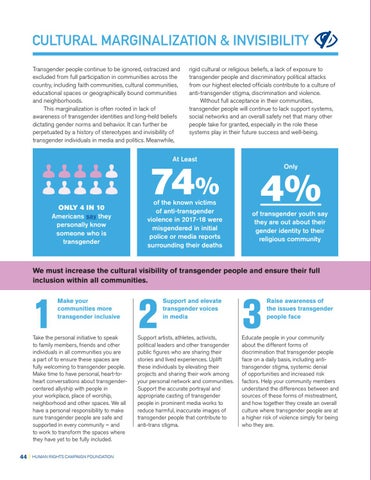CULTURAL MARGINALIZATION & INVISIBILITY Transgender people continue to be ignored, ostracized and excluded from full participation in communities across the country, including faith communities, cultural communities, educational spaces or geographically bound communities and neighborhoods. This marginalization is often rooted in lack of awareness of transgender identities and long-held beliefs dictating gender norms and behavior. It can further be perpetuated by a history of stereotypes and invisibility of transgender individuals in media and politics. Meanwhile,
rigid cultural or religious beliefs, a lack of exposure to transgender people and discriminatory political attacks from our highest elected officials contribute to a culture of anti-transgender stigma, discrimination and violence. Without full acceptance in their communities, transgender people will continue to lack support systems, social networks and an overall safety net that many other people take for granted, especially in the role these systems play in their future success and well-being.
At Least
ONLY 4 IN 10 Americans say they personally know someone who is transgender
74%
of the known victims of anti-transgender violence in 2017-18 were misgendered in initial police or media reports surrounding their deaths
Only
4%
of transgender youth say they are out about their gender identity to their religious community
We must increase the cultural visibility of transgender people and ensure their full inclusion within all communities.
1
Make your communities more transgender inclusive
Take the personal initiative to speak to family members, friends and other individuals in all communities you are a part of to ensure these spaces are fully welcoming to transgender people. Make time to have personal, heart-toheart conversations about transgendercentered allyship with people in your workplace, place of worship, neighborhood and other spaces. We all have a personal responsibility to make sure transgender people are safe and supported in every community – and to work to transform the spaces where they have yet to be fully included.
44
HUMAN RIGHTS CAMPAIGN FOUNDATION
2
Support and elevate transgender voices in media
Support artists, athletes, activists, political leaders and other transgender public figures who are sharing their stories and lived experiences. Uplift these individuals by elevating their projects and sharing their work among your personal network and communities. Support the accurate portrayal and appropriate casting of transgender people in prominent media works to reduce harmful, inaccurate images of transgender people that contribute to anti-trans stigma.
3
Raise awareness of the issues transgender people face
Educate people in your community about the different forms of discrimination that transgender people face on a daily basis, including antitransgender stigma, systemic denial of opportunities and increased risk factors. Help your community members understand the differences between and sources of these forms of mistreatment, and how together they create an overall culture where transgender people are at a higher risk of violence simply for being who they are.
